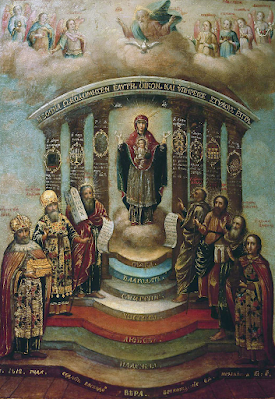Throughout Church history, Orthodox theologians from the Second Council of Nicaea (787) to the 20th century Russian "Sophiologist" Sergei Bulgakov have identified the Divine Feminine in God with "Holy Wisdom" (which is a translation of the feminine Greek term "Hagia Sophia", and the Hebrew term "Hokmah"). Nicaea II states it thus: "Our Lord Jesus Christ, our true God, the self-existent Wisdom (Sophia) of God the Father, who manifested Himself in the flesh, and by His great and divine dispensation freed us from the snares of idolatry, clothing Himself in our nature, restored it through the cooperation of the Spirit, who shares God's mind..." In more recent configurations, Divine Wisdom is identified as a personified attribute shared by all the members of the Trinity, yet primarily embodied in Jesus Christ. This has led to charges against Sophiologists that they have made Divine Wisdom into a fourth member of the Trinity, or a kind of separate "Mother Goddess" like Gaia.
Theology, Ethics, and Spirituality centered on the Trinity and Incarnation, experienced through Theosis, in Sacramental Life, leading to Apokatastasis, explored in maximally inclusive ways. And other random stuff.
2022-12-23
2022-12-21
God's relationship with the world and culture
This is intended to help us understand how "Scripture speaks" on various topics. I have taken topical outlines I created for preaching and teaching, and reformatted them as articles to provide minimal framing and commentary, so that Scripture passages on certain topics may be collected, read, and meditated on. This is not an exhaustive commentary on Scripture, but rather an opportunity to collect thematic Scriptures together to see the trajectory that Hebrew and Christian Scriptures take, and how they converge and diverge on various topics. This is drawn from my own eclectic reading in Biblical and Systematic Theology, as well as topical resources such as Alister McGrath’s Thematic Reference Bible, Walter Elwell’s Topical Analysis of the Bible, Nave’s Topical Bible, Bible Gateway online, and the Open Bible online.
In order to understand how to navigate our relationship with the world we live in, and the cultures we are immersed in, we need to understand the relationship of God to our world and the cultures in it. This can be difficult, because at different times in Scripture, there are different relationships between God's people and the world they inhabit, and the cultures that surround them. Sometimes, such as during the Davidic Kings of Judah, God's people were in charge of their culture and were directed to use that culture for the full flourishing of the people in it. Other times, such as during the Babylonian Exile or the period of Roman domination, God's people were called to create their own culture in the midst of cultures that ranged from being apathetic toward God's people, to being actively hostile to them. Despite this diversity of cultural context, there are some common Biblical themes that emerge:
2022-12-12
Twas the Night Before Christmas, Gym Edition
2022-12-07
Making Artificial Intelligence in the Image of God?
As we have recently read about in the New York Times and the Atlantic, very powerful Artificial Intelligence programs have now become available for free or cheap online. Programs of similar capabilities have been around for a few years and have even written Op Eds. But what has changed is that the same computing power and access to AI is now available to the masses. In particular, I have had dozens of conversations with this AI:
I have used this AI to produce topical sermons, fictional stories, literary comparisons, romance novels, historical essays, fake quotes, philosophical analyses, theological explanations, legal arguments, Biblical interpretations, mathematic equations, science term papers, working computer code, workout plans, recipes, topical prayers, free verse poetry, Shakespearean sonnets, and even rap battles between historical figures (and these are only what I have tried since last weekend!). In fact, I interviewed this AI to introduce it to the faculty at my school.




